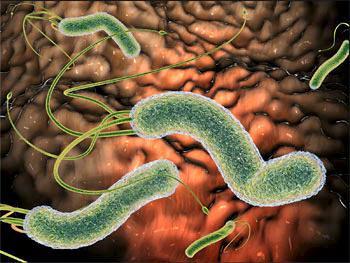Some tumors are closely linked to previous infection by a microorganism. A paradigmatic example of this association is gastric cancers, which largely would not exist without the action of Helicobacter pylori, a bacterium that often colonizes the gastric mucosa of humans.
Researchers from the International Agency for Research on Cancer (IARC/WHO) are analyzing this week the impact that this small bacterium can have on global cancer figures. According to their estimates, 15.6 million people born between 2008 and 2017 worldwide will develop gastric cancer at some point in their lives, and 76% of those tumors - around 11 million - will be related to the action of Helicobacter pylori if there are no changes in the prevention of these tumors.
The data from the study, published in the latest issue of Nature Medicine, also show the estimated figures for Spain: in a population at risk of 4.7 million people, 58,641 cases of gastric cancer will be detected, 44,436 of which will be due to the action of H. pylori.
To carry out their calculations, the team led by Jin Young Park analyzed the incidence rates of gastric cancer recorded in 2022 in 185 countries and combined them with mortality projections for each nation.
The study points to Asia as the continent that will host the most cases in the coming years, with 10.6 million cases, 68% of the total. This will be followed by the Americas region with 2 million cases, Africa with 1.7 million, Europe with 1.2 million, and Oceania with 0.07 million.
Two-fifths of the global cases - around 6.5 million - will occur in two countries that have already shown a high incidence of this type of tumors, China and India, according to the data from the study, which also warns that regions that currently have a low incidence, such as Africa, could multiply by six the cases recorded in 2022.
In their conclusions, the scientists emphasize that the numbers of gastric tumors associated with H. pylori infection could be reduced by 75% with the implementation of population screening and treatment strategies for the bacterium.
Javier P. Gisbert, a researcher in the Digestive System area of the Princess Health Research Institute (IIS-Princesa), the Autonomous University of Madrid (UAM), and the Biomedical Research Networking Center for Hepatic and Digestive Diseases (CIBEREHD), explains that indeed the link between Helicobacter pylori and gastric cancer is very close. "If this bacterium were eradicated from the planet, most gastric cancers could be prevented," he points out.
However, there is currently a debate about when and under what circumstances screening focused on detecting the bacterium in the general population should be carried out.
In his opinion, this active strategy of searching for the bacterium in asymptomatic people makes sense in areas where the incidence of gastric cancer is high. "However, in countries with a relatively low incidence, such as Spain, it is not established that this measure is cost-effective," he notes.
In Spain, the current recommendation is to carry out diagnostic tests to detect the presence of the bacterium in specific situations, such as in patients with first-degree relatives with gastric cancer or patients under 55 years of age who present symptoms such as dyspepsia. In these cases, the recommendation is to perform non-invasive tests (which do not require endoscopy), such as a breath test or a stool antigen test, to detect the pathogen and, if positive, to undergo treatment with a cocktail of antibiotics.
The emerging threat of rat hepatitis E
Infection by a common virus enhances the response to melanoma treatment
H. pylori infection affects approximately 50% of the world's population. However, only around 1% of those infected by the bacterium will eventually develop gastric cancer. In the case of Spain, the latest incidence studies, dating back more than a decade, show similar figures, although experts point out that the incidence may have decreased somewhat in recent years, in parallel with the improvement of socio-sanitary conditions in Spain.
Last June, a study led by Gisbert, the principal investigator of the European H. pylori Registry (which currently involves 40 countries and almost 100,000 patients), showed deficiencies in the management of Helicobacter pylori infection in Spain.
According to their data, there are discrepancies between the recommendations of consensus guidelines for managing the problem and actual practices in clinics. Thus, according to their data obtained after a survey of 128 Gastroenterology specialists throughout Spain, 17% of professionals did not investigate the presence of H. pylori in patients with digestive bleeding from peptic ulcers, and 35% did not initiate treatment at the time of diagnosis in these bleeding patients. In addition, only 37% periodically evaluated the effectiveness of the treatments to eradicate the infection administered in their healthcare center.
